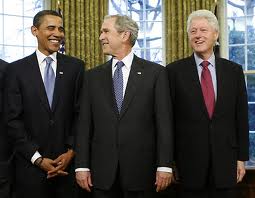
The theme of the president’s 2012 reelection campaign is that George W. Bush left such a terrible mess that Barack Obama could hardly be expected to clean it up in four years. In other words, 44 months of unemployment rates above 8 percent, $5 trillion in new borrowing, $16 trillion in aggregate debt, gas prices of nearly $4 per gallon, a dive in average family income, and involvement in two wars were all due to George Bush and simply too difficult for anyone to overcome. So Obama cannot be judged on his record between 2009 and 2012.
At first glance, this is a most unusual claim. Gerald Ford followed the mess of Richard Nixon’s Watergate scandal and the Arab oil embargo. After serving for less than three years, he failed to win reelection. His successor, Jimmy Carter, seemed to make a bad situation even worse. He exited four years later, tagged with a high “misery index” fueled by rampant unemployment and roaring inflation. Ronald Reagan took office under Carter’s baleful legacy but ran for reelection successfully in 1984 based not on “Carter did it,” but on the recovery he engineered.
Bill Clinton was elected in 1992 on “It’s the economy, stupid,” and he was reelected four years later after claiming credit for boom times. George W. Bush inherited the aftershocks of the dot-com meltdown and a country ill-equipped to respond to terrorist assaults after the nonchalance of the 1990s. Despite the 9/11 attacks, Bush was reelected on the themes of a good economy and a safer country. Blaming or praising presidents for their four years of governance is an American tradition. That is why Obama asserted at the outset that if he could not turn around the economy, his presidency would be a “one-term proposition.”
Like all presidents, Obama inherited both positive and negative legacies. True, there was a war in Iraq, but the surge — which candidate Obama opposed — had by mid-2008 mostly won the peace. That is why General David Petraeus and Ambassador Ryan Crocker had already negotiated a timetable for American withdrawal. Obama followed that settlement; he no more ended the war alone than did he start it. For Obama to claim sole credit for ending the war in Iraq would be about as fair as blaming Obama for making things worse in Afghanistan — although more than twice as many Americans have died in that war on Obama’s watch than were lost during seven years in the Bush administration.
Obama did inherit a terrible economy in January 2009, but one not quite still in the full freefall of the mid-September 2008 panic — which abruptly gave Obama a four-point lead over John McCain in the polls after being down four points.
By Inauguration Day 2009, the gyrating stock market had bottomed out. The TARP (Troubled Asset Relief Program) rescue package had been enacted under Bush in October 2008, stopping runs on the banks and mostly restoring financial stability.
Blaming your predecessor for some of the mess is legitimate in politics, but the housing bubble and collapse — the catalysts for the September meltdown — were a bipartisan caper of pushing Freddie Mac and Fannie Mae to underwrite risky subprime loans to the unqualified who had no business buying homes at inflated prices. Washington insiders ranging from Clintonites Rahm Emanuel (Obama’s former chief of staff) and Franklin Raines (a Clinton administration grandee) to Tom Donilon (the current national-security advisor), James Johnson (an Obama campaign bundler), and Jamie Gorelick (deputy attorney general in the Clinton administration) got in on the Freddie/Fannie profit-making despite thin banking résumés. Even with the four months of crisis at the end of his second term, Bush still averaged a 5.3 unemployment rate for his eight years in office.
Obama should be congratulated for ordering the successful hit on Osama bin Laden. But the intelligence apparatus and antiterrorism protocols that provided much of the expertise for the mission were well established when Obama entered office. And despite his own prior verbal attacks on Guantanamo Bay, renditions, tribunals, preventive detention, and the Patriot Act, he almost immediately embraced all of these without a nod of thanks to his predecessor.
Obama, for example, inherited the controversial Predator-drone program, anathema to liberals during the Bush administration. But Obama expanded the drone missions and in less than four years has approved the killings of seven times as many suspected terrorists as Bush had in seven — to the sudden silence of the antiwar Left.
It is past time for President Obama to forget Bush and, like all of his predecessors, make the argument that things are better than when he entered office almost four years ago, and that he deserves the credit for the turnaround.
Voters will weigh that claim. And history will judge George W. Bush on his two terms — as it will judge Barack Obama’s own four (or eight) years in office.
— Victor Davis Hanson is a classicist and historian at the Hoover Institution, Stanford University, and the author, most recently, of The End of Sparta. You can reach him by e-mailing author@victorhanson.com. © 2012 Tribune Media Services, Inc.



